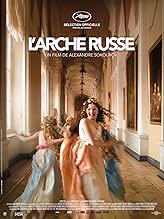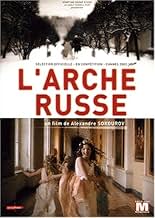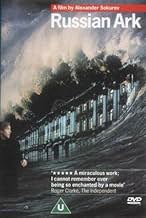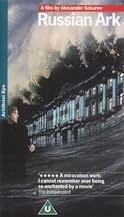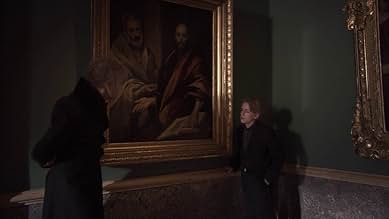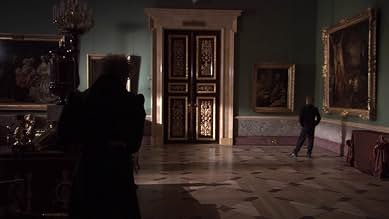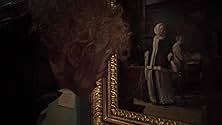अपनी भाषा में प्लॉट जोड़ेंA 19th century French aristocrat, notorious for his scathing memoirs about life in Russia, travels through the Russian State Hermitage Museum and encounters historical figures from the last ... सभी पढ़ेंA 19th century French aristocrat, notorious for his scathing memoirs about life in Russia, travels through the Russian State Hermitage Museum and encounters historical figures from the last 200+ years.A 19th century French aristocrat, notorious for his scathing memoirs about life in Russia, travels through the Russian State Hermitage Museum and encounters historical figures from the last 200+ years.
- पुरस्कार
- 10 जीत और कुल 15 नामांकन
फ़ीचर्ड समीक्षाएं
It would have been enough that the director got extensive access to the Hermitage Museum in Petersburg to show it to us.
It would have been enough to have authentic costumes, choreography, and make-up for several centuries of Russian history. (I was reminded that my husband's grandmother was a young seamstress for rich folks like these, making this extravagant lifestyle possible.)
It would have been enough to have literally a cast of thousands because how else can one really know how those fantastic ballrooms and grand staircases were meant to be used and seen without a full orchestra and gowned and uniformed participants as far as the camera can see?
It would have been enough to come up with a cute gimmick of a time-traveling two-some to glide us through the rooms of the Hermitage to show the tsars, aristocrats, curators, and ordinary Russian tourists who have passed through over the years, with humorous commentary on Russia's changing relationship with Europe over these centuries as shown through the art and architecture of the building while wars and revolutions loomed outside.
But then, it would have been enough that it's all done in a single take over just an hour and a half with luscious cinematography.
There was a slow line to get in the theater so I missed the opening historical background, and I've learned most of my Russian (let alone European) history from novels and movies so I did get a bit lost here and there wandering the corridors of history, but the unseen narrator posits that this is all a dreamscape anyway.
I made a point of seeing this because a fellow cinephile who I frequently bump into at my local arthouse had directly called the distributor asking when it would be playing elsewhere and was told they can't afford to make more prints available so one can only see it at the Manhattan theaters -- so make a point to see it on a movie screen and not just wait for when the History Channel shows a reduced version.
I was drawn to this film as I have recently had to install digital television in my house (just for 24!) and I figured that I might as well see what the channels had to offer. After working out that I had access to numerous shopping channels I also found that I had BBC4, the arts and history channel, and that it was to be showing this film. I was interested in it not for my love of Russian history but for the fact that it was done in one take and, for that reason, I quite enjoyed it.
As far as plot goes, I really think you need to have an existing knowledge of Russian history as this film will not help you understand anything about it other than a passing impression. This was the case for me as I know next to nothing of the history, but I was still able to gleam some things about the political relationships between Russia and Europe as well as some of the main players. However it never got to the point where I was taken or engaged by the material; interested is perhaps a more fitting word to use - and that's still a good thing.
Technically the film is gripping and very impressive. Much was made of Snake Eye's 20 minute one-take opening (even thought it was actually 3 takes) or Goodfella's seamless move from street to table, but this film blows them away. I cannot even imagine the sheer logistics involved in creating such an effect. It would be impressive if the film was all shot in one room with a few cast members, but this film moves around the museum with a cast of thousands and set pieces that vary from two people looking at paintings to a massive ballroom scene. I was held totally impressed by the whole film as the entire one take was delivered seamlessly, without flaw. For this reason the acting is impressive whether it is Dontsov's acerbic Frenchman or just some extra's - everyone had to get it right bang on time and they did.
Overall this film will be a masterpiece if you have a good working knowledge and understanding of Russian history. However even if you don't know that much (like me), the technical aspect of this film will impress you no end even if the material is best seen as `interesting' at best.
Russian Ark portrays the Hermitage as a kind of cultural and historical ark floating on centuries of Russian seas. The narrative device is a shadowy eighteenth century Frenchman who wanders the halls and time periods, commenting often with good-natured European condescension on what he sees. He is accompanied by a Russian who is never seen, and who questions him about his comments. The movie ranges through time with appearances of Peter the Great, Catherine II, Pushkin, Nicholas II and his family, generals, maids, flunkies and diplomats. The Frenchman, played with great style by Russian actor Sergei Dreiden, takes us to painting and sculpture galleries, kitchens, ballrooms, storerooms, basements and living quarters as we observe things that happened in the Hermitage over the centuries.
At first, I was very aware of the technical feat of no cuts. Gradually, though, I think most people just relax and accept the skill of the director and photographer, and become immersed in what they are seeing. A kind of unreal imagery takes hold. The movie ends with the last dance held in the Great Ballroom before WWI. Hundreds of actors and dancers, in full costume, swirl around this ornate setting, and swirl around the camera as well, while the camera glides through the crowds. It's a terrific scene, and is followed by the end of the dance with all the hundreds of guests making their way through the halls and staircases to leave the building, with the camera facing them and moving along in front of them.
This is a highly unusual film, probably a great one.
Not knowing a lot of Russian history, some of the scenes didn't make much sense, but I did cotton on to Anastasia being late for tea. Maybe she got away after all. There was nothing from the Soviet era, except a brief scene during the German siege of Lenningrad (a million died, mainly from starvation, and many made coffins for themselves before they expired). This seems appropriate, since the communists contributed nothing to the buildings, which were started by Peter the Great and added to by his successors. A bad fire in 1837 was followed by extensive reconstruction and many of the rooms we see in the film date from that time.
I suppose this is the first film in which the set is the star and the actors merely props. There is in fact one dramatic part, that of the French Marquis who attended the Tsar's court in the 1840s, and who is somehow able to take us backward and forward in time. Even he is a bit two-dimensional, in fact the other, unseen, presence (the voice of the director of the film) is as real.
Towards the end we attend a great ball, and the Marquis gets to dance the Marzurka again. The music is great (is that Glinka conducting something of this own?) and the atmosphere gay (as somebody says `you can't be shy for the Mazurka') and for a moment history is forgotten. But we don't have a plot, the characters are cut-outs (with the exception of Catherine who seems to have been one of the more boisterous Empresses in history) and, basically, nothing happens. Yet I found myself absorbed by it all, occasionally wishing I could click my mouse to zoom in on an interesting painting. Ironically, much of the art is non-Russian, so `Russian Ark' is something of a misnomer `Euro-Ark' is nearer the mark. At the end of the day, though, I am lost with admiration for the cinematographer, who managed to keep his digital camera running and pointed in the right direction for 90 minutes without making a mistake. Madness, brilliant Russian madness.
क्या आपको पता है
- ट्रिवियाShot in a single take. The first three attempts were cut short by technical difficulties, but the fourth was successful.
- गूफ़Many extras look to the camera and they quickly return to a default mark.
- भाव
The Time Traveller: Sir. Sir. A pity you're not here with me. You would understand everything. Look. The sea is all around. And we are destined to sail forever, to live forever.
- कनेक्शनEdited into Spisok korabley (2008)
- साउंडट्रैकMazurka
(from opera "A Life For The Tsar")
Music by Mikhail Glinka
Performed by Mariinsky Theatre Orchestra
Conducted by Valery Gergiev
टॉप पसंद
- How long is Russian Ark?Alexa द्वारा संचालित
विवरण
- रिलीज़ की तारीख़
- कंट्री ऑफ़ ओरिजिन
- भाषाएं
- इस रूप में भी जाना जाता है
- Russian Ark
- फ़िल्माने की जगहें
- उत्पादन कंपनियां
- IMDbPro पर और कंपनी क्रेडिट देखें
बॉक्स ऑफ़िस
- US और कनाडा में सकल
- $30,48,997
- US और कनाडा में पहले सप्ताह में कुल कमाई
- $29,022
- 15 दिस॰ 2002
- दुनिया भर में सकल
- $86,91,860
- चलने की अवधि1 घंटा 39 मिनट
- रंग
- ध्वनि मिश्रण
- पक्ष अनुपात
- 1.78 : 1
इस पेज में योगदान दें







